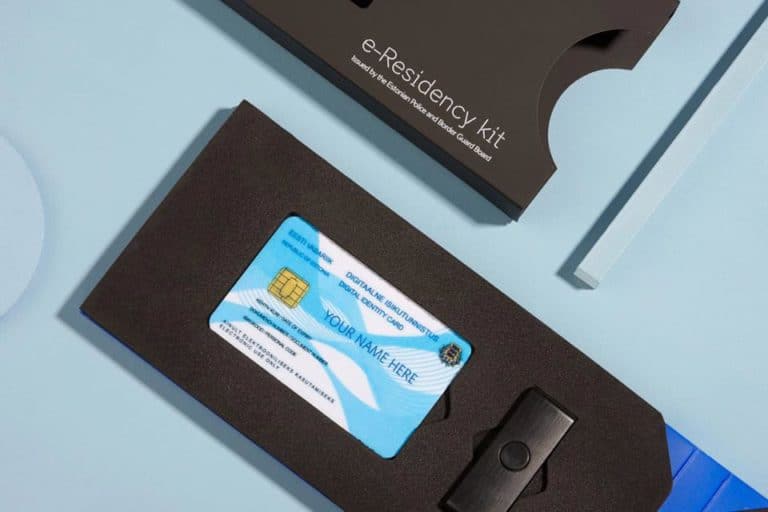It may seem like a strange suggestion to open a company in Estonia, but the truth is that this small Baltic country is gaining prominence for being one of the most technologically advanced and secure countries in the world.
Almost all administrative processes are done 100% digitally. Also, Estonia’s laws and taxes for entrepreneurs and self-employed people are very attractive when compared to other countries.
After the article we published about E-residency, we received tons of comments and questions. The main question we received pertaining to Estonia was: how do I open a company in Estonia?
I decided to wait for the whole process to be over so that I could share my experience. This article is a guide to help you understand how everything works and to give my opinion about the program, including benefits, and a step-by-step how-to guide!
How to open a company in Estonia
If you want to open a company in Estonia and gain E-residency, we’re here to help make the process clearer for you.
It’s possible to complete the process by yourself, or with a company. I used Xolo – an accounting and business management service in Estonia. Using this service has always given me a sense of confidence and tranquillity, thanks to their specialised services.
It’s important to note that Xolo does not open companies with partners. Their focus is on freelancers and the self-employed. There are some other alternatives, but it is best to contact them to learn more about such specifics
Official website: https://www.xolo.io/
Now, let’s take a look at the steps you must take to apply!
1. Identify your motivation for applying
The first step is the process of ascertaining your motivations for starting the company. Then, you will have to provide details about your business and how it operates remotely.
You can perform this process by logging on to the official E-residency website.
In the case of Xolo, you’ll need to log in to the company’s official website and start your registration. There will be a number of questions about your business, as they need to understand all your activities and how you intend to operate your company.
Xolo will then send you an email indicating whether your company fits the criteria of their program or not. After this verification, they will accept your application, and you can start the E-residency program.
2. Applying for E-residency
For the second step, you’ll have to apply for the E-residency program by filling in all the data on the official Estonian Government website.
Here is a summary of the most important things to remember when applying for Estonian E-residency:
- The fee for this stage is €100, but if you apply for the corresponding “ID card” outside Estonia, they add a fee of €20 euros, totalling €120. If your request is rejected, they will not refund this amount;
- The card will not be delivered to your home, you must select one of the pick-up locations (Estonian Embassies) listed on the site and pick it up in person. Luckily, this is the only task that requires your physical presence;
- There are numerous locations in several countries, but it doesn’t cover the whole world yet;
- The deadline for receiving an answer with the result of your application is 30 days. I had my response 18 days after sending all the data and making the payment.
3. Receiving the E-residency starter kit
After your application has been approved, the Estonian government will send your E-residency starter kit via diplomatic courier to the chosen pickup location that you have indicated on the registration form. This step takes between 2 and 5 weeks.
After receiving the confirmation e-mail, go to the indicated location to leave your fingerprints and receive the kit. The process is very simple and takes less than 15 minutes to complete.
The kit is composed of:
- Digital ID card;
- USB card reader;
- Codes and the access stick.
With these tools and documents, you will then be able to verify your identity and digital signatures, and proceed with your company’s registration.

4. Registering your company
The time has come to register your company! The first step is to hire a local service in Estonia. It will be your address in the country and will also act as your accountant.
Then, once chosen, you must fill out the government form to open a company in Estonia and wait for approval. The cost for this step is €265. Generally, the result comes out in 3 hours.
Remember that Xolo performs this process, acting as your accountant, as this is one of the services included in the monthly fee.
In July 2025, get 2 months free to discover Xolo Leap Pro !
Click here: Activate Promo Offer
5. Open an account in a digital bank
You will need a bank account to operate the company, and the best option is to opt for a digital bank and open a Wise account for businesses, since Wise provides multi-currency accounts.
If you’re thinking of opening an account in a digital bank, take a look at the Wise website.
If you decide on a physical branch, you will have to go there to open an account in person. You should check which is the most feasible option for you.
6. Make a capital contribution
Finally, you just need to make a capital contribution to get your business in Estonia up and running.
You may be wondering how you can possibly accomplish all these steps without any help. The truth is that you can do everything yourself, but I always advise you to look for qualified companies to help you.
How much does it cost to open a company in Estonia?
I decided to create a small summary with the corresponding costs for each step, including Xolo’s monthly fee if you choose to do so. I believe it will help you a lot, check it out:
Service | Price |
|---|---|
Applying for Digital ID | €100+ €20 = €120 |
Company registration | €265 |
Commercial Registration | €25 + IVA* |
Xolo’s monthly fee | €79 + IVA* |
*Value added tax.
What is E-residency in Estonia?
E-residency is a program that the Estonian government has created to provide anyone in the world with an “electronic residence” in the country. But you may be wondering, how does it actually work?
First, you should know that E-residency it does not provide legal residency. E-residence only works as an identification to be able to carry out different legal procedures in the country, not only to open a company in Estonia, but to run it efficiently.
The program began in 2014, and ever since, Estonia has been the pioneer of this new form of residency. One of the goals has been to break down digital borders and attract businesses and freelance workers, with the benefit of lower taxes than most countries.
By becoming an electronic resident in the country, you can open a company in Estonia and open a European bank account. It will then be possible to run the company without ever having set foot in the country.
Who is E-residency for?
The E-residency program is mainly targeted at digital business entrepreneurs and freelancers who want to open a company in Estonia and have a “company number”. More specifically, it was designed for:
- Remote workers who provide services 100% online;
- Those who have a company with high growth potential;
- Digital nomads who want a way to manage their business remotely.
- For people who don’t have Estonian citizenship, but want to have some opportunities to undertake business in the country legally.
As you can see, this scheme is perfect for the digital nomad lifestyle!
What are your banking options?
To start a business, you will need a bank account. You are free to choose between traditional and digital banks.
Here’s a table showing examples of institutions that are cleared for e-residency:
Traditional banking | Fintechs |
|---|---|
SEB (Sweden) | Wise Business |
Swedbank (Sweden) | Revolut |
LHV ( Estonia) | N26 |
Holi |
What are the advantages and disadvantages of E-residence in Estonia?
To summarise all the details we’ve covered, I have to create two lists. The first one outlines the main advantages of E-residency, and the second one its disadvantages.
I hope that this information will give you a clearer picture about the program. Let’s check it out:
Advantages
- Reduction of bureaucratic issues if you intend to open a company in Estonia;
- Ease of business management;
- The company will be seen by the country as a national company;
- Most of the processes can be done over the internet, including managing the company.
Disadvantages
- Need to find a physical address in the country (Remember that Xolo can solve this problem in a simple way);
- No tax exemption in the country of fiscal residence;
- The whole process does not guarantee citizenship, but merely the possibility to open a company in Estonia;
- Risk of double taxation.
It’s good to emphasise that the last item is illegal, and you, the entrepreneur, must be very attentive, and if you are double taxed, you should look to uphold your rights.
What business activities are accepted?
The country’s main objective is to attract self-employed professionals and freelancers who work 100% remotely. The areas and activities are diverse, giving you a wide range of opportunities.
To give you an idea, today there are over 70,000 E-residents and more than 10,000 companies open. Most of them saw Estonia as a place that encourages the growth of small, innovative organisations. Estonia is commonly referred to as the world’s most digitally advanced country.
Sectors and industries
For this reason, more and more sectors are included in the list of possibilities. Here are the main areas that E-residents are working in:
- Blockchain;
- Cybersecurity;
- E-commerce;
- Logistics;
- Healthcare;
- Food;
- Fintechs.
Did you notice the diversity of sectors? This is evidence of Estonia’s successful drive to provide opportunities for digital entrepreneurship and innovation.
Again, traditional banks will require your physical presence, so if you decide on a traditional bank, you will need to go to the branch to open the account.
Taxes and Fees in Estonia
Estonia has a unique policy regarding the payment of taxes, and you will only pay for the money that leaves your company. This means that if money is invested, paying for fixed and variable expenses for the company, it is practically tax-free.
You can make use of different activities to pay for company expenses, such as office rent, online tools, airline tickets, and other activities that need to be paid for by your company.
Tax rates in Estonia
Another point that we must highlight, is that income tax is charged monthly and only after profit distribution (i.e. when dividends are paid). Normally, the corporate tax rate is 20%, with the calculation of 20/80 of the net taxable payment.
Here’s a huge benefit of Estonia’s E-commerce scheme: unlike many comparable countries, Estonia has actually lowered its taxes for entrepreneurs. What does this change?
Companies in Estonia who regularly pay out profits as dividends can benefit from a 14% corporate income tax rate. In short, if you work as a freelancer and wish to receive some of your profits (or all of it) as a dividend, you will only be taxed at 14%.
E-residents with businesses in Estonia will need to consider the following Estonian taxes:
- 20% corporate tax on director’s fees;
- 33% social tax on the director’s fees.
Residence for tax purposes
If you have residence in any EU, or treaty country (Canada, Australia, and Ukraine for social tax purposes), personal tax deductions are not considered, so you only pay 20%.
For digital nomads, or those who do NOT have personal residence in the mentioned countries, it offers the possibility to adopt a social tax model where Estonia collects this social tax and provides them with health insurance and pension.
To avoid the company having to pay 33% for social tax in Estonia, you must obtain an A1 certificate proving your coverage from competent local authorities and submit it to the Estonian tax authorities.
The A1 and other forms relating to social security rights are listed here, but more specific information is probably available in your home country:
- If you live and have social security insurance in Canada, Ukraine, or Australia – countries that have concluded a Social Security Agreement with Estonia – you can submit the respective certificate demonstrating your social security coverage issued by your local authorities. This is to allow the company to exempt directors’ fees from social tax in Estonia.
- Directors’ fees paid to residents of third countries or to those persons not covered by a social security scheme in the EU, EEA countries. Switzerland or treaty countries will not be able to get the Estonian social tax exemption.
How do your tax obligations work?
First, it’s important to understand that your personal tax residence and your company’s tax residence are not necessarily the same. You need to differentiate that once you decide to open a company in Estonia, as they are entirely different things.
When you open a company in Estonia, you will only pay the company’s residency tax. Personal tax will be paid in your country of residence, through income tax, for example.
To be clear, when profits are eventually distributed as dividends, the 20% tax is paid by the company (as corporate income tax) and not by the person receiving the dividends. There is no withholding tax on dividends in Estonia.
In most cases, the receiving person (legal or natural) needs to pay dividend or income tax according to the taxation rules of their country of residence.
Personal Tax
Personal taxes include a wide variety of services, from pensions, to health care and education. Understand that your personal and business taxes are not always the same. Each country has its own way of designating and processing tax residence.
Personal tax is generally applicable where you have a physical address, either your country of birth, or the one in which you have citizenship, or a residence permit.
Many countries consider you a tax resident if you have a residence permit and are present in the territory for more than 6 months of the year.
Digital nomads in Estonia
In Estonia, you are considered a tax resident if you are in the country for at least 183 days a year. However, note that having E-residency does not make you an Estonian citizen.
Having a country of tax residence is far from being a problem, and it’s typical for digital nomads to have a country of origin, and a residence permit in another country.
In short, the tax you have to pay is on your income when you receive your salary from your company. For this process, you need to have an accountant or platform that can help you with all these issues. That is one of the reasons I use Xolo.
Company Taxes
Corporate income tax is paid by your company where it has tax residency. It’s up to you to decide where your company will have its tax residence, and thus, be subject to all the obligations of the chosen nation.
The most important thing is to make sure that all taxes are paid so that you don’t run into any issues with the tax authorities in the future.
To avoid confusion, since this is a matter that deserves a lot of attention, I advise you to seek help so that you don’t have to waste time or have something go wrong. After all, the motivation to open a company in Estonia is to have more ease, among other things.
When you open a company in Estonia, you will automatically be considered a tax resident. To avoid double taxation, Estonia already has 57 bilateral treaties, includes all EU member states and the vast majority of OECD countries, plus Ukraine and Turkey.
Why is it a good idea to open a company in Estonia?
Estonia is now considered to be the most digitally advanced society in the world. You’ll find that there are plenty of incentive programs for freelancers and online entrepreneurs, and many of advantages to starting a business in the country.
Estonia was the first country to offer E-residency, a program that started in late 2014 and already has more than 70,000 E-residents around the world, and provides you with digital residence and Estonian tax identification. Needless to say, I am very satisfied!
Doing business in Estonia
In addition, the country offers a competitive and innovative business atmosphere. The government, in turn, is very supportive of various forms of entrepreneurship. It sounds like a dream, doesn’t it? I simply must mention the benefits of the scheme once more:
- Estonia’s tax policy and low tax rate;
- A highly educated and entrepreneurial-minded population;
- A well-developed telecommunications infrastructure;
- The possibility of opening accounts in online and traditional banks in the country;
- Ease of filing tax returns;
- The E-residency program, which speeds up and facilitates the opening of a company in Estonia even more.
With all these features, you can rest assured that opening a company in Estonia can be a good business opportunity for you, which is why I started the E-Residency process, even without ever having visited the country.
Frequently Asked Questions
Is it safe to open a business in Estonia?
As mentioned earlier, Estonia is one of the safest countries in the world for E-commerce. This is because it has been investing heavily in digital security technologies after having digitised its entire system.
The question remains, however: can I keep my data safe with the kit provided when opening a company in Estonia?
Yes. With the Kit, you get a card with a high-tech cryptographic chip, and with the USB, you simply connect it to your computer, keeping your date safe in the process.
Is Estonia a tax haven?
No. Opening a company in Estonia is not about not paying taxes. The difference is that Estonia has a clear and innovative tax system, in which you only pay tax on funds you actually use.
It isn’t necessary to pay tax on all the money that isn’t distributed as profits. All money generated by the company, and invested in it, is tax-exempt. However, if you need to withdraw funds, you have to pay the tax.
How long does it take to gain E-residency and open a company in Estonia?
In my experience, the process takes approximately:
- 18 days to receive the E-residency kit
- 24 hours to register your company with Xolo
- 2 days to open a bank account with Wise Business
That’s 21 days in total.
Conclusion to opening a business in Estonia
E-residency is the best way to open a company in Estonia. In fact, it is the only way if you do not actually live in the country.
Furthermore, the whole ease of being able to do everything online is a great relief for those who are constantly on the move. This is undoubtedly the main highlight of the Estonian government’s initiative.
Although it may seem that everything is done magically, there is quite a long process, from applying for E-residency, to completing the process of opening a company in Estonia.
My final tips
In my experience, it’s essential to have a company to help you during the entire process. As I said before, I ended up choosing Xolo due to its good reputation, and so far, I have nothing to complain about.
During the process, many questions arise and having someone to explain all the details is invaluable. I don’t think it would be worth doing it alone, considering the time I would lose doing hours of research.
I would be remiss if I didn’t mention tax once more. Estonia’s tax scheme is straightforward, with lower rates than in most countries. Remember, despite their low tax rate, Estonia is not a tax haven, taxes do exist and must be paid correctly.
I hope this guide has helped you with your ambitions to open a company in Estonia. Best of luck!








